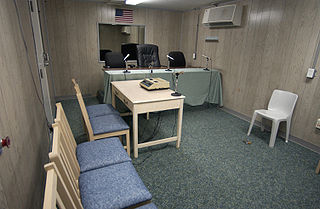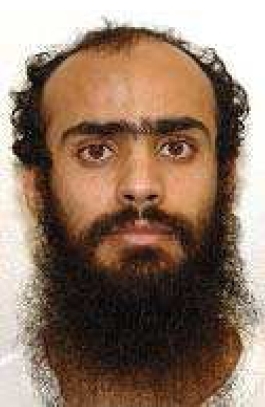
An unlawful combatant, illegal combatant or unprivileged combatant/belligerent is a person who directly engages in armed conflict in violation of the laws of war and therefore is claimed not to be protected by the Geneva Conventions. The International Committee of the Red Cross points out that the terms "unlawful combatant", "illegal combatant" or "unprivileged combatant/belligerent" are not defined in any international agreements. While the concept of an unlawful combatant is included in the Third Geneva Convention, the phrase itself does not appear in the document. Article 4 of the Third Geneva Convention does describe categories under which a person may be entitled to prisoner of war status. There are other international treaties that deny lawful combatant status for mercenaries and children.

The Combatant Status Review Tribunals (CSRT) were a set of tribunals for confirming whether detainees held by the United States at the Guantanamo Bay detention camp had been correctly designated as "enemy combatants". The CSRTs were established July 7, 2004 by order of U.S. Deputy Secretary of Defense Paul Wolfowitz after U.S. Supreme Court rulings in Hamdi v. Rumsfeld and Rasul v. Bush and were coordinated through the Office for the Administrative Review of the Detention of Enemy Combatants.
Competent Tribunal is a term used in Article 5 paragraph 2 of the Third Geneva Convention, which states:
Should any doubt arise as to whether persons, having committed a belligerent act and having fallen into the hands of the enemy, belong to any of the categories enumerated in Article 4, such persons shall enjoy the protection of the present Convention until such time as their status has been determined by a competent tribunal.
Abdullah Mujahid is a citizen of Afghanistan who is still held in extrajudicial detention after being transferred from United States Guantanamo Bay detainment camps, in Cuba — to an Afghan prison. His Guantanamo Internment Serial Number was 1100.
Ahmed Adil is a citizen of China who was held in extrajudicial detention in the United States Guantanamo Bay detainment camps in Cuba.
Starting in 2002, the American government detained 22 Uyghurs in the Guantanamo Bay detainment camp. The last 3 Uyghur detainees, Yusef Abbas, Hajiakbar Abdulghupur and Saidullah Khali, were released from Guantanamo on December 29, 2013, and later transferred to Slovakia.
Sami Abdul Aziz Salim Allaithy Alkinani is an Egyptian professor who was held in the Guantanamo Bay detention camps, in Cuba. His Guantanamo Internment Serial Number was 287. Analysts reported that he was born on October 28, 1956, in Shubrakass Egypt. He was repatriated to Egypt on September 30, 2005. He was later classified by the United States Department of Defense as a no longer enemy combatant.
Adel Hassan Hamad is a citizen of Sudan, who was held in the United States Guantanamo Bay detention camp, in Cuba. Joint Task Force Guantanamo counter-terrorism analysts estimate he was born in 1958, in Port Sudan, Sudan. Adel Hassan was repatriated to Sudan without charges on December 12, 2007.

Ali Ahmad Muhammad Al Rahizi is a citizen of Yemen who was held in extrajudicial detention in the United States Guantanamo Bay detainment camps, in Cuba. His Guantanamo Internment Serial Number is 45. Joint Task Force Guantanamo counter-terrorism analysts reports he was born on October 13, 1979, in Taiz, Yemen.
No Longer Enemy Combatant (NLEC) is a term used by the U.S. military for a group of 38 Guantanamo detainees whose Combatant Status Review Tribunal (CSRT) determined they were not "enemy combatants". None of them were released right away. Ten of them were allowed to move to the more comfortable Camp Iguana. Others, such as Sami Al Laithi, remained in solitary confinement.
Abdel Hamid Ibn Abdussalem Ibn Mifta Al Ghazzawi is a citizen of Libya who was held from June 2002 until March 2010 in the Guantanamo Bay detainment camps, in Cuba because the United States classified him as an enemy combatant. His internment number was 654.
Boumediene v. Bush, 553 U.S. 723 (2008), was a writ of habeas corpus petition made in a civilian court of the United States on behalf of Lakhdar Boumediene, a naturalized citizen of Bosnia and Herzegovina, held in military detention by the United States at the Guantanamo Bay detention camps in Cuba. Guantánamo Bay is not formally part of the United States, and under the terms of the 1903 lease between the United States and Cuba, Cuba retained ultimate sovereignty over the territory, while the United States exercises complete jurisdiction and control. The case was consolidated with habeas petition Al Odah v. United States. It challenged the legality of Boumediene's detention at the United States Naval Station military base in Guantanamo Bay, Cuba as well as the constitutionality of the Military Commissions Act of 2006. Oral arguments on the combined cases were heard by the Supreme Court on December 5, 2007.
The Combatant Status Review Tribunal the US Department of Defense commissioned, like the tribunals described in Army Regulation 190-8, which they were modeled after, were three member panels, led by a tribunal president.
Stephen Abraham is an American lawyer and officer in the United States Army Reserve. In June 2007, he became the first officer who had served on a Combatant Status Review Tribunal to publicly criticize its operations. He said the evidence provided did not meet legal standard, and the members of the panels were strongly pressured by superiors to find that detainees should be classified as enemy combatants. Abraham served in the Office for the Administrative Review of the Detention of Enemy Combatants.
Al Odah v. United States is a court case filed by the Center for Constitutional Rights and co-counsels challenging the legality of the continued detention as enemy combatants of Guantanamo detainees. It was consolidated with Boumediene v. Bush (2008), which is the lead name of the decision.
In United States law, habeas corpus is a recourse challenging the reasons or conditions of a person's detention under color of law. The Guantanamo Bay detention camp is a United States military prison located within Guantanamo Bay Naval Base. A persistent standard of indefinite detention without trial and incidents of torture led the operations of the Guantanamo Bay detention camp to be challenged internationally as an affront to international human rights, and challenged domestically as a violation of the Due Process Clause of the Fifth and Fourteenth amendments of the United States Constitution, including the right of petition for habeas corpus. On 19 February 2002, Guantanamo detainees petitioned in federal court for a writ of habeas corpus to review the legality of their detention.
Rafiq Bin Bashir Bin Jalud al Hami is a citizen of Tunisia, who was formerly held for over seven years without charge or trial in the United States's Guantanamo Bay detention camps, in Cuba. His Guantanamo Internment Serial Number was 892. The Department of Defense reports that he was born on 14 March 1969, in Tunisia.

Al-Qaeda is understood to have operated a number of safe houses, some of which were used as training centres.




